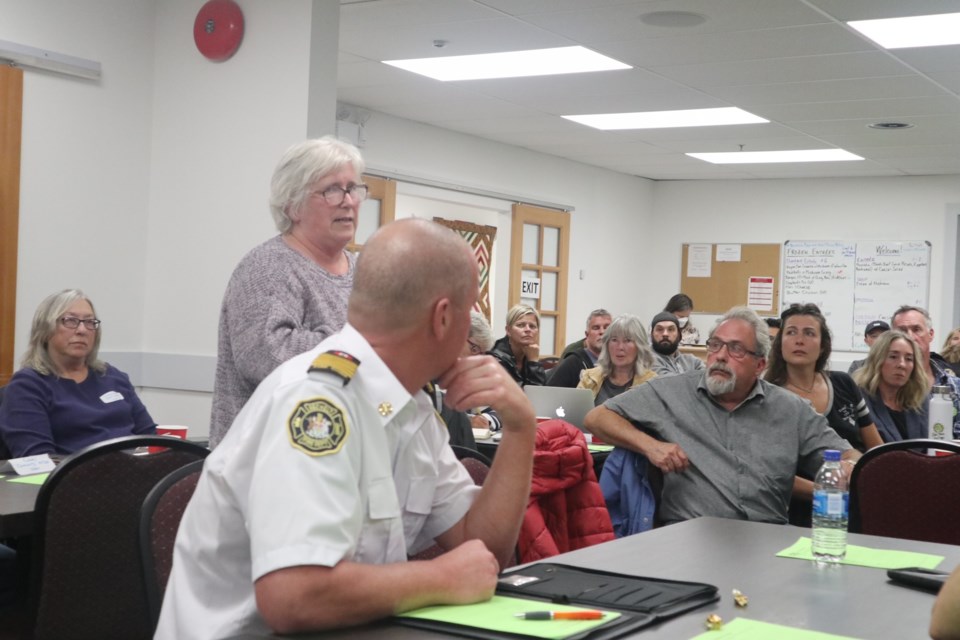About 50 downtown Sechelt business people attended a Sept. 26 event in search of help amid losses they attribute to an increase in the area’s un-housed and drug-using populations. Sechelt council representatives in attendance suggested greater business involvement with the Community Safety Select Committee and Action Team, groups they said are already working on those issues.
Sechelt Mayor John Henderson and safety committee chairperson Coun. Brenda Rowe were among those who filled the Sechelt Seniors Activity Centre dining area for those discussions. Detailed were over a dozen firsthand accounts of break-ins, shoplifting, open illicit drug use and increased encounters with individuals displaying “crazy, manic behaviours” around downtown workplaces. A local glass supplier reported billings to customers of more than $100,000 for repairs related to break-ins and vandalism in the last six months. A store operator recounted three shoplifting events in a single day by one individual. A 30-year area resident and business owner said over the past two years she has regularly found human feces and urine at her shop’s back entrance and that concerns for personal safety have ended her evening dog walks in that neighbourhood.
The call to bolster and leverage energies of established groups is echoed as one of three “next steps” in a change framework drafted following the session. Identifying priority actions, and then implementing and tracking their progress are also recommended in a draft that was shared with Coast Reporter. It is being prepared by local non-profit PIVOT Empowerment, Education and Recovery Society and Alyssa Farr from B.C.-based enterprise accelerator group Purppl (Purposeful People) who co-facilitated the discussions.
Farr called the plan “a structured and strategic path for the community to translate their vision into tangible actions."
Once finalized, PIVOT’s Dana Caple said the document will be shared with session participants including the Sechelt Downtown Business Association (SDBA).
Reporting, lobbying keys to more resources
As the evening’s discussions shifted from the current situation to how to improve it, SDBA executive director Theressa Logan stressed the importance of reporting all crime in the area to the RCMP. That followed expressions of frustrations from business reps about the time that reporting takes and the disconnect between crime commission and consequences for the perpetrators. Logan’s view was that to secure resources from the province to address issues, the community needs to show evidence of what is happening. That, she said, could be done through statistics generated from reports to the RCMP. The need for more resources was summed up by one business owner who stated “our hands are tied without funding."
“The fact that you need a base of evidence in order to advocate from is not up for question,” Farr stated, suggesting that changing how and by whom reporting is done could be a better approach to addressing related frustrations.
In what one attendee called a move from “paying for bandages” to “addressing the source of the wound," the issue of funding for addictions recovery services was raised. A dearth of local mental health and addictions services compared to the local needs was pointed out. The speaker said allowing supportive housing facilities to be built without ensuring such resources for new residents were in place was a failure on the part of local government.
Supporting efforts to introduce recovery services by the shíshálh Nation was raised, as was the possibility of using Vancouver Coastal Health’s (VCH) Shorncliffe facility for that purpose once the existing residents are transferred to the new Trellis Seniors Care Facility. “We know its going to be empty, so we should start with planning for a new use now” one participant stated. Mayor Henderson indicated his agreement and encouraged the community to take action towards that end. He said, “Why don’t we put the bug in [VCH's] ear, we can do the thinking for them."
Henderson told the group he had been advised that the emergency shelter at the Upper Deck facility on Wharf Avenue is being repaired and would reopen on Oct. 15. That site has been closed since damaged by fire on Feb 7. That facility provides temporary overnight accommodation to those need and at the time of the fire had 34 occupants.
Is crime worse in Sechelt than Gibsons? Why?
Questions were raised by attendees about why crime appears to be impacting downtown Sechelt more than Gibsons. PIVOT event facilitator TJ Sheehan noted that local coordinators of facilities for the hard-to-house populations in both communities, RainCity Housing, were invited but not in attendance at the discussion. He commented that the clientele of Gibsons’ supportive housing complex are “older” than those living in the Sechelt-based facility. Others noted that as home to the Coast’s hospital and most local Ministry of Social Development and Poverty Reduction services, Sechelt is a more attractive location for un-housed people who need to access those services.



.jpg;w=120;h=80;mode=crop)